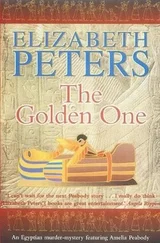“Do you know where we are?” I asked. “You have been here before, haven’t you? You must know the city well.”
“It has changed a great deal since my day” was the reply.
From anyone else I would have interpreted that as evasion. From Mr. Plato it sounded like a casual reference to a visit he had made in the first or second century B.C.
“What was it like in your day?” I asked.
The carriage turned a rather sharp corner, swayed, and stopped abruptly. The impediment appeared to be a camel, whose hindquarters were visible just ahead. Our driver rose, brandished his whip, and began shouting at the beast and its driver. The effect, as he must have known it would be, was negligible. The camel didn’t even look round. Its rider made gestures of an indeterminate but probably rude nature at our driver, who responded with another flow of invective. I poked him with my parasol.
“Be patient,” I said in Arabic. “Our future is in the hands of Allah.”
Realizing that I had understood his curses, the driver turned an embarrassed face toward me. “We are almost there, lady,” he stammered.
The camel proceeded calmly on its way. It did clear a path for us; donkeys and pedestrians were forced to one side, since a camel yields to no one. It was not long before we entered a newer section of the city. The streets were wider and straighter. I was conscious of mounting fatigue, for we had started early that morning, and I was considerably relieved when the carriage stopped before a modern structure.
Emerson had decided we would not stay at the same hotel as Morley. His was on the Mount of Olives, not in the city itself, and “…we don’t want the fellow to think we are trailing him.” This was, in my opinion, an absurd argument. We were trailing him, and he would soon know that. It was, I deduced, Emerson’s little way of forestalling any complaints I might make about our own hotel.
In fact, it was not nearly as bad as I had feared, and a distinct improvement over the one in Jaffa. Jewish and Christian pilgrims, Ottoman dignitaries in fezzes like crimson flowerpots, and turbaned Arabs mingled in the comfortably furnished lobby and the dining room, and an efficient young Egyptian assistant manager saw us to our rooms. They were among the best in the establishment, consisting of a sitting room and a number of sleeping chambers. An adequate if primitive bath chamber was just down the hall.
Accompanied by Mr. Fazah, I personally inspected the arrangements and approved them. He was about to take his leave when I asked him to wait a moment. Raising thumb and forefinger daintily to the tip of my nose, I wriggled it back and forth.
He appeared somewhat taken aback. “Was there anything else, madam?” he asked, averting his eyes.
I had assumed that this establishment, like the one in Jaffa, had connections with the secret service. If so, the assistant manager was not the connection. It was of course possible that Boniface had deliberately deceived me. To picture me making that absurd gesture to one bewildered person after another might have been his notion of a joke.
I dismissed the young man with appropriate thanks, and in a somewhat thoughtful mood returned to the sitting room, where I found Emerson pouring the whiskey.
“You had better not be so liberal with it,” I remarked, taking the glass he handed me. “I don’t know whether it is easily obtainable here. Moslems don’t indulge, nor the stricter Christian sects; is the same true of Orthodox Jews?”
“It probably depends on the particular sect. Fear not, Peabody. Anything is obtainable in this country for a price.”
“I believe the same is true of most countries, Emerson. Even dear old England.”
“True.” Emerson took a long refreshing sip. “We both know places in London where one can hire an assassin or a-er-companion, or purchase any variety of deadly drugs. You aren’t drinking, my dear. Is something wrong?”
“Yes. No. Oh, Emerson, I am having second thoughts about our decision to come on here. Are we doing the right thing?”
“Well, my dear, you rather railroaded us into it,” Emerson remarked. “It is unlike you to question your own decisions.”
His jesting remarks were intended to stir me up, but my mood was too somber. With nothing else to do during the long carriage ride, I had had all day to rethink my decision-for it had been mine, and I had not allowed dissent or discussion.
“But now we have lost both boys,” I murmured. “What if-”
“No what-ifs, Peabody. Bear in mind they are not boys but young men who have had a good deal of experience in unusual situations. Give them a few more days.” He patted my hand. “Now cheer up and drink your whiskey like a lady.”
FROM MANUSCRIPT H
“What have you done to him?” Ramses pulled away from Mansur and knelt beside David. There was blood on his face, but he was breathing evenly.
“He brought it on himself.” Mansur sounded somewhat rattled. “He should not have resisted. I must-I have another matter to attend to.”
The guard had backed off a few feet, his weapon raised. Ramses gave him an ingratiating smile, and prodded David.
“I know you’re awake. Sit up very, very slowly and tell me what the hell you’re doing here.”
“Looking for you.” David opened one eye and then the other. Ramses braced his shoulders as he raised himself, very very slowly, to a sitting position. “I went to Samaria and-”
“You needn’t explain what you did.” The same idea might have occurred to him if their positions had been reversed. David had shown himself at or near Samaria, dressed like Ramses and imitating his mannerisms and speech as only David could do, in the hope that word would get back to the kidnappers that there was a second Ramses Emerson on the loose. It was a wild, crazy scheme, but obviously it had worked. Up to this point. He and David did look enough alike that a verbal description would have matched both: six feet tall, black hair and eyes, thin faces and prominent features, brown skin. But no one seeing them together could mistake one for the other.
“Why did you put up a fight when they caught up with you?”
“I felt it advisable to live up to your reputation for bellicosity.” David raised a hand to his head and winced. “It may not have been such a clever idea.”
Worry made Ramses’s voice sharper than it should have been. “Not that I don’t appreciate your good intentions, but I can’t see that they have improved the situation. Unless you have a pistol or two tucked into your trouser pockets.”
“’Fraid not. They searched me quite thoroughly. But it was worth it. At least now I know you’re alive.”
Touched, terrified, and furious, Ramses found it difficult to speak for a moment.
“Talk fast,” he said urgently. “The guard doesn’t understand much English, but Mansur won’t leave us alone together for long. What made you believe I was a prisoner when I wrote that note?”
“It was enclosed in a woman’s handkerchief. Your mother was the first to point out that if you had done something so uncharacteristic as run off with a woman, you wouldn’t have advertised it. But she said she could think of several innocent reasons why someone else-”
“Yes, she would.” For once Mansur had been a little too clever.
And it had led to this.
“Who are these people?” David asked. “And what do they want?”
“Good question.” He wondered what was delaying Mansur. Was it David’s unexpected advent that had thrown him off balance, or was something else going on? Well, they would find out soon enough. No use crying over spilled milk, as a lady of his acquaintance might have said. Take the bull by the horns and time by the fetlock, put your shoulder to the wheel, and figure out what to do now.
Читать дальше








